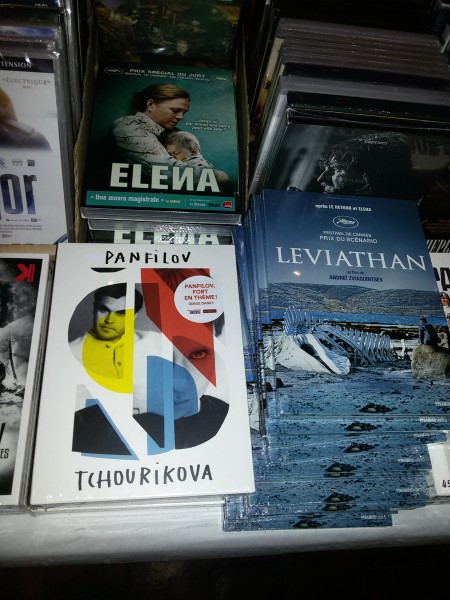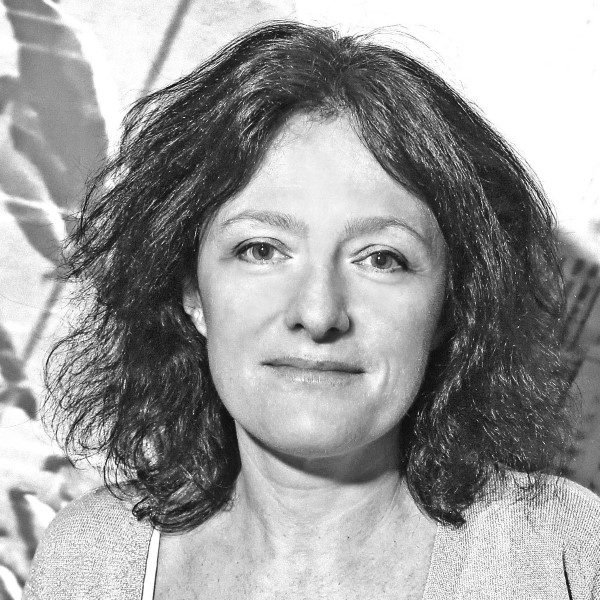Our compatriot Elena Duffort has been living in France for many years. She graduated from Cinematology Department of the Russian State University of Cinematography and is now engaged in organizing Russian Film Festival in Honfleur. She told the “Russkiy Mir” about why French people continue watching Russian movies with pleasure.
Russian Film Festival was held for 24th time in Honfleur (Normandy) this year. Every time in there, you turn out to be among the people, who are ready to help any minute: to give you a lift, provide information, get something you need from home, in case it is needed to organize the festival. They are volunteers, but not students, as we got used to, but people of considerable age.
Elena Duffort
– You have unusual volunteers at your Festival. Who are they and how are they attracted?
– The are the Russian Film Festival’s Friends Association, for whom the Festival is a real event. They love what they do and are enthusiastic. They started recognizing the Russians, who come here – producer Elena Glikman, actor Aleksey Guskov and many other filmmakers from Russia. They like that their Russian friends come to them. They read French publications about them and facebook each other. Friends come to them, this is the motivation. Our volunteers receive no reward and the only thing they get is a lunch for festival volunteers.
– It is surprising. In Russia, senior people are not usually too required, at least, they would not be asked to volunteer.
– In Honfleur, they are not just the people, who check tickets at entrance, but those, who organise the Festival, I’d say – its organizing committee. They do not take money for their work, the same as the President of the Festival Francois Shnerb. She can even add her own money instead of receiving something. So, apart from the honour and joy to organize the Festival every November, they do not have anything. Some bring their printers, some – paper. The director of the Festival told me on the day of closing, that she did not like tablecloths and she brought her own silk ones.
– Why did you decide to hold a round-table discussion “Can Movies be History Guides”?
– This year, we had a history program, we had a film “So There were Stars” by Sergei Snezhkin, main heroes of which are Nursultan Nazarbayev, Mikhail Gorbachev and Boris Yeltsin. It seemed to be interesting to talk about how our history is reflected in cinema. The answer was however not found. We discussed how young people, who have not seen Soviet Union because if their age, will study history based on cinema. Is it only the director’s responsibility to show everything as it is – it was an interesting discussion.
French audience is interested in the history of the Soviet Union. We underestimate how the French are informed about Russian history and culture. Some of them remember something we have forgotten about.
– How do interests of French viewers change? What do they want to see?
– As an organizer of the Festival, I want Russian cinema to interest my viewer. Foreigners often think that if a film is Russian, someone will be necessarily killed. I wanted to show films, which would not be identified as strictly Russian. So, two years ago I made a programme, consisting of hits, which had a great success. The audience came to see “Yolki” (Six Degrees of Celebration) film to see a family film.
This year, my son came to the Festival with his girlfriend for the first time. She knew nothing about Russian cinema then. When seeing her off to Honfleur, her family insisted on preparing for the trip. When she took three discs from her bag, with films she watched before the Festival, it were Mikhalkov’s “An Unfinished Piece for Mechanical Piano” and Tarkovskiy’s “The Mirror” and “Stalker” – I was on the brink of tears. “The Mirror” is my favourite film. I always cry while watching it. And the girl said: “My father cries all the time, too”. And it is a person, who knows no word in Russian, has no relation to Russia. She knew nothing about Russia before meeting my son, too. I want to attract such a viewer to the Festival.
Kashtanka’s Monument in Honfleur
– Why exactly these three films, I wonder?
– It is about knowing the Russian literature, the best examples of Russian and Soviet cinema, something every educated person should know. French people have kindness to work with.
– What is the main stereotype about Russians in France?
– Stereotypes depend on age. Now many think that Russia is an evil and terrifying country. We get written accusations like how can you show Russian movies, when there is such a situation in the world. Those people, who know our country, can tell the truth from lies. Many read something in newspapers and that’s all of their knowledge. I ask them: “Have you seen Russian films?”
We are oriented on another kind of audience. People, who are trying to understand the mysterious Russian soul, Dostoyevsky, Tarkovsky. In case they get disappointed, I tell them that Russian soul is not just about melancholy, so we fight against balalaikas, bears and babushkas at the Festival. The Russian soul is not only about them.
– This year the jury was headed by French writer and director Frédéric Beigbeder. What is his image of Russia?
– He is one of the most published authors in Russia. He has a loving view of Russia. He is an ex-advertising expert and he is a bit bodacious. He knows Russian literature and cinemas, loves Eisenstein, can quote Sokurov’s “Russian Ark” and has watched Tarkovskiy’s films.
Last year, Frédéric came to a private viewing of Russian film “Discovery” based on novel by Tendryakov. When he came to the hall, where ordinary people were sitting, they almost fainted. Frédéric is such a person, who wants to know something new all the time. When it became clear that Beigbeder would become the head of jury, my first purpose was to surprise him.
– Is he really so popular in France, if the audience is ready to faint?
– He is very popular thanks to television and a programme he is hosting on the French radio. He is also the head of a popular men’s magazine. If you ask anyone in Paris about Beigbeder, he or she will answer: “Frédéric? I know him, he wears black glasses.” Beigbeder comes to Russia every time his books are published ever since 2000. Every bookstore has full shelves of his books, he has many friends in Russia and he knows it not from a touristic point of view.

Books about Russian films at Honfleur Festival
– Did your own work on making Russian cinema popular start from Honfleur Festival?
– No, from “Kinoglaz” web-site. I came there because I wanted to write. All in all, I graduated from Cinematology Department of Russian State University of Cinematography and finished post-graduate studies there. Only after that, I met the organisers of Honfleur Festival, its President Francois Shnerb and she offered me job. After finishing the Russian State University of Cinematography I turned up to be in Germany. I worked in mass media there, advertising. After that, I moved to France for family reasons and learned French.
– Have the Ukrainian or Syrian events affected your Festival, co-producing with Germany and other cultural actions?
– They did not affect organisations of the Festival. Our team is continuing working with the same enthusiasm, no one quit. As I have already said, some people wrote to us they will never come to our Festival again. There were also letters to Beigbeder, where people ask him why he has agreed to become the head of jury. It is very insulting, certainly. We respect everybody’s point of view, but the Fesival’s point is that we are working in a cultural environment with different governments and in different political situations.
Next year, we are going to hold 25th Festival. Sure, there are material issues – Festival’s financial support has not risen, I suppose, for political reasons, as well. What comes to co-production, political situation has not affected it.










